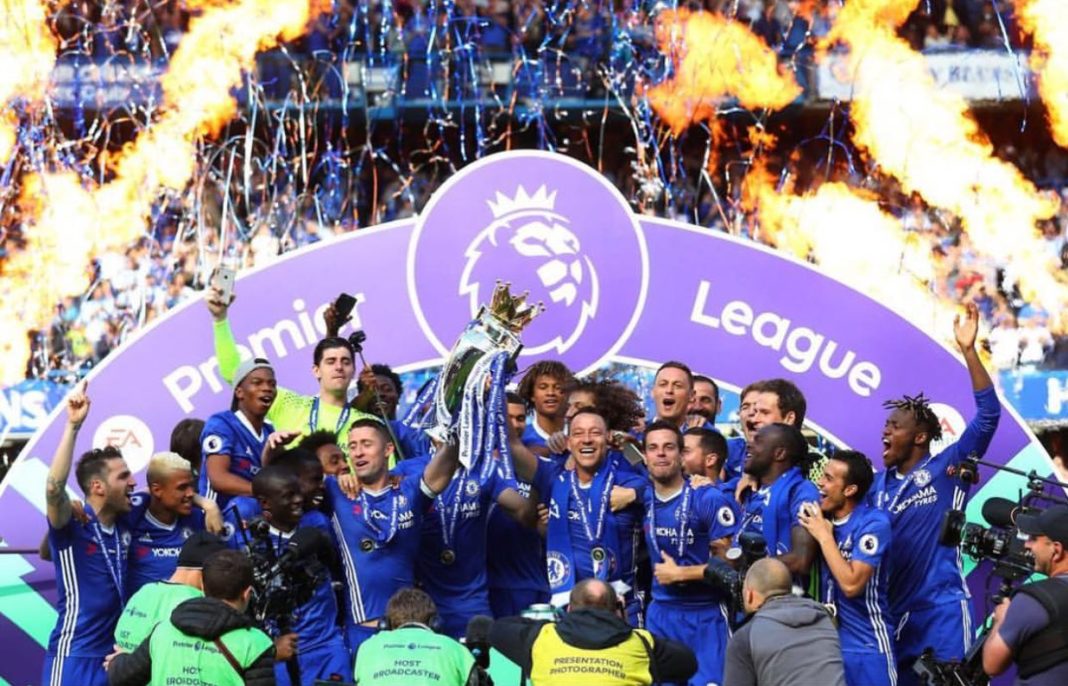Another dramatic season in the greatest soccer league on the planet has come to an end. Chelsea are champions again under first-year manager Antonio Conte, becoming the ninth manager to win the title in 25 years of the Premier League. Of those nine, Conte is the sixth manager to top the EPL table in their first full year with a club in the League. This counts Sir Alex Ferguson, who won the first Premier League title. It was not his first year with the club, but it was technically the club’s first year in the League, and therefore his first year as a Premier League manager. (Plus, in discussions on great managers Sir Alex Ferguson MUST ALWAYS be included.)
Beyond Conte’s Chelsea, plenty of intrigue built up over the course of the season. Managers were shuffled in the bottom half as the fight for survival became fiercer than the fight for the title. Manchester United was somehow both incredibly disappointing and successful at the same time. The polarizing season of José Mourinho doesn’t compare, though, to the ongoing war that divided the league. Every pundit chose a side and all of London had their stance on the battlefield. No, I’m not talking about the title race between Chelsea and Tottenham. I’m talking about WENGER IN vs. WENGER OUT.
“Wenger In” Prevails
From beginning to end, no English Premier League analysis program was complete without a word on the Arsenal managerial situation. Arsène Wenger has been the manager at Arsenal F.C. since 1996. His 21 seasons and counting are the closest threat to Sir Alex Ferguson’s record of 27 years at the helm of an English soccer side. His success has been appreciated by all, but many believe his methods are outdated. The French manager is known as a controlling presence in the club, refusing to bring in personnel specialists on staff. As someone who presides over many facets of the club, his 19 straight group stage appearances in the UEFA Champions League are that much more impressive. A vigorous finish to this league campaign elevated them to just fifth in the table and left them on the outside looking in for a Champions League opportunity.
BREAKING: @Arsenal confirm manager Arsene Wenger has agreed a new two-year contract. #SSNHQ pic.twitter.com/Xz2zvAAbvv
— Sky Sports News HQ (@SkySportsNewsHQ) May 31, 2017
A spectacular mix of rejoicing and dismay has met the news of Arsenal’s decision to extend the Wenger Era another two years. Some feel it is a decision arrived upon by a content and distanced owner in Stan Kroenke. The sports business mogul, who practically owns the professional sports landscape in Colorado, has been rather busy moving his NFL franchise (Rams) from St. Louis to Los Angeles.
As a sports fan, I tend to favor a contract extension over a change in management, all other things being equal. In this case, Wenger has become an icon. Moving on from him almost guarantees a decline in success. As long as he is willing to put in the hours, let him. He finished outside the top four…once? In 20 years? Good luck replacing that.
Year of the Manager
The Premier League hasn’t had a 30-goal scorer since Luis Suárez. Harry Kane’s 29 are hardly honorable considering his final seven goals came in senseless drubbings of Leicester and Hull. Only six players finished higher than 35-year-old Zlatan Ibrahimović, who played nine fewer matches (27) than the next highest scorer (Hazard, 36 matches). Without a prolific Golden Boot winner, the league has leaned on the personalities on the touch lines. The tireless Antonio Conte, loveable Jürgen Klopp, and pensive Wenger added character to every match.
Back in the mix.
Report: Bob Bradley renews talks with @LAFC. https://t.co/HQcVD0ucOd pic.twitter.com/bbBlwt9Zxf
— Major League Soccer (@MLS) February 16, 2017
We saw the first hiring of an American manager by a Premier League team. We also saw the first sacking of an American manager by a Premier League team. Swansea found hope in Bob Bradley until the relegation battle victimized him for Paul Clement. Bournemouth’s Eddie Howe has quietly become the second-longest tenured manager while leading the Cherries to a top-ten finish. David Moyes’ ungainly offense towards a female news reporter coupled well with Sunderland’s desolate drift back to the English Football League. There’s no doubt that Kane, Lukaku, and Costa had their moments on the pitch, but this was the Year of the Manager.
Premier League Table Stabilizes
After what some consider to be the most bizarre season of Premier League soccer in history, the pendulum has begun to swing back. Jose Mourinho lifted the trophy with Chelsea in 2015 and was unemployed half a season later. Leicester City scampered away with the title in 2016 while the defending champions dropped 37 points from the previous year, finishing 10th. That decline represented the largest point differential by a club in consecutive seasons. Well, it would’ve if Leicester hadn’t picked up 40 more points than their 2015 total.
Congratulations to @ChelseaFC boss Antonio Conte - @Barclays Premier League Manager of the Season for 2016/17! pic.twitter.com/DcyznfRDV1
— Premier League (@premierleague) May 22, 2017
*Perhaps a cause for concern? Mourinho won Manager of the Season with Champions Chelsea in 2015 and Claudio Ranieri was MotS for Champions Leicester last year. Both were sacked during the subsequent season…
This season, Leicester matched Chelsea’s meteoric fall of 37 points down the table. Following Chelsea’s lead, Leicester fired Claudio Ranieri midway through their title defense. Chelsea bettered the Foxes’ improvement by finding 43 more points in 2017 than the year prior. A metric that may never be rivaled- the Blues and Foxes combined for a 157-point total differential in three seasons. Elsewhere, Liverpool made its way back into the top seven along with Everton, after 8th and 11th place finishes respectively in 2016. Not since 2013/14 had the seven modern contenders all finished in the top seven spots.
Manchester United’s Road Less Travelled
Prior to the season, the ACAA soccer department predicted the top four finishers in the league. Not one of the writers left Manchester United out of the group. The club brought in a world-class manager and signed just four new players: Pogba, Ibrahimović, Bailly, and Mkhitaryan. With that kind of summer, you’d expect a trophy. However, with all these resources at his disposal, Jose Mourinho found himself sitting fifth in the table with no momentum in the EPL. He glanced at the calendar, counted 9 matches in April, and did some math.
.@ManUtd's Jose Mourinho makes Europa League the priority, says he might rest players vs. @Arsenal. https://t.co/g5CkDfRyhM pic.twitter.com/v00vk5hcti
— NBC Sports (@NBCSports) May 4, 2017
After Matchweek 33, United had seven league games remaining and was entering the semi-final of the Europa League. Based on the final table, five wins and two draws would have secured a fourth place finish from that point. Comparatively, one good win could put them in a winner-take-all match for a Champions League spot by winning the Europa League. The decision essentially put Manchester United’s season on the line. Through April and May, Mourinho offered first team experience to some Reserves and Under-23s while resting his best XI. On the day of reckoning in Stockholm, United won its first Europa League trophy, entered the group stage of next year’s Champions League, and salvaged their season. The path leaves room for criticism, but José Mourinho got the job done.
Congratulations, @ManUtd! 🏆 #EuropaLeague champions for 2016/17! pic.twitter.com/QrBUGTOYq4
— Premier League (@premierleague) May 24, 2017
For quality up-to-date sports reporting, visit our website, like us on Facebook, and follow us on Twitter.
For all your collegiate and professional apparel needs, check out 365 Gameday.




No mention of Liverpool making huge strides to get back into the Champions league? had it not been for some injuries to Coutinho, Mane’s leave and a bad slide in January they could have pushed for a second place finish … they have to be favorites going into next season knowing that Klopp is going to dump Sturridge and make some interesting additions
Perhaps not enough direct praise to Liverpool. They do exemplify the point that the managers played large roles this season. For Klopp to achieve a top four finish despite the setbacks you mentioned is impressive. Their return to contention is part of the table stabilization that I talked about as well. I thought Firmino was one of the league’s best forwards this year. An addition to the front line this summer or consistency from Mane could translate to another improvement. I think EPL favorites is a bit ambitious, but by no means out of the question.